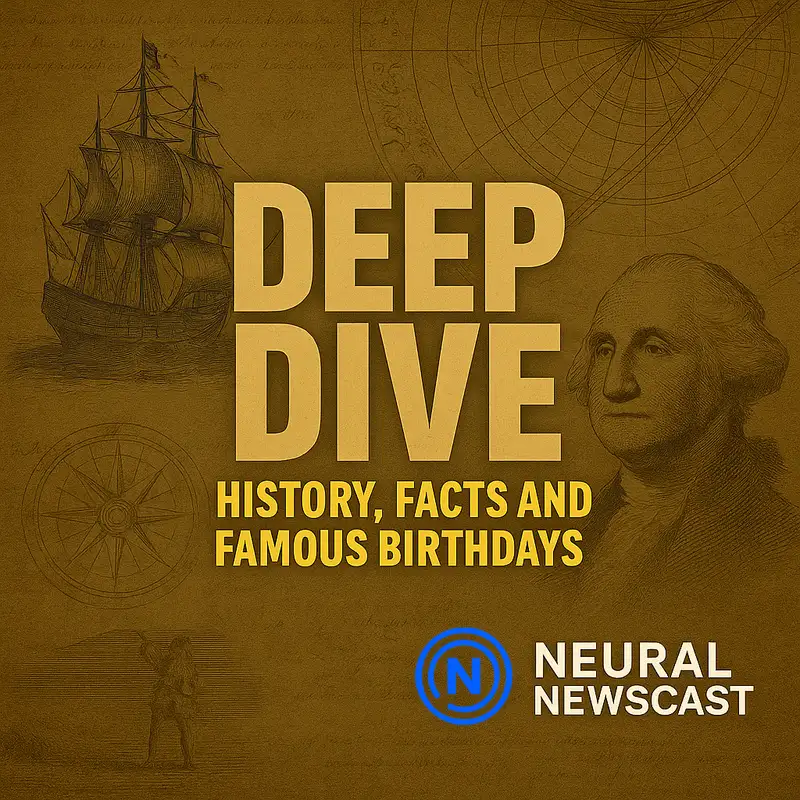Deep Dive: Cables, Compromise, and Cosmic Storms: How Communication Shapes Power - August 17, 2025
Your headlines, synthesized and verified.
This is Neural Newscast.
Thanks for joining us for this Neural Newscast deep dive.
I'm Monica, and alongside Elizabeth, we're about to uncover some intriguing stories.
The moment when the telegraph first connected Europe and North America underwater,
laying that Atlantic cable, changed diplomacy overnight.
Messages that once took weeks could now traverse oceans in minutes,
and governments suddenly had to think about instant international response.
It's wild to think about the ripple effects on everyday people and markets.
Trade contracts, stock prices, even consumer confidence began to move faster because information did.
Merchants could react to news from across the sea without waiting for a ship.
Absolutely. And for diplomats, it was seismic.
Ambassadors could consult home governments quickly.
Crises were managed differently and summitry started to take on a new tempo
because leaders expected quicker feedback.
From a consumer perspective, that speed created new expectations,
faster settlement of bills, quicker confirmation of shipments,
and the birth of risk on information latency.
People began to price goods with timelier intelligence,
which nudged markets toward modern volatility.
And don't underestimate the geopolitical dimension.
Control over cable routes and landing stations became strategic assets.
Nations realized infrastructure was as much a part of influence as fleets and armies.
Which then influenced private investment, companies and banks poured money into telegraph enterprises,
betting that faster communication meant better arbitrage opportunities and more efficient supply chains.
It also reshaped journalism.
Correspondents could file near real-time dispatches,
transforming public awareness of distant events and consequently public pressure on policymakers.
Right?
Right. Readers expected timelier reports. Advertisers followed audiences and the news cycle shortened.
That consumer demand loop pushed both media and markets to prioritize speed.
There's a human angle too. Families separated by ocean could receive news of births, deaths, disasters much sooner,
altering the emotional landscape of migration and diaspora communities.
That's a powerful point.
Quicker news meant decisions about remittances, travel, and even emigration could be made with less uncertainty,
which has real economic and social consequences at the household level.
And the technical feat itself, engineering across storms, deep-sea pressures, and primitive insulation,
set a precedent for global projects, collaboration between engineers, financiers, and states to build connective infrastructure.
Investors certainly noticed.
Successful cable projects attracted more capital into transnational ventures,
and failed ones taught hard lessons about risk allocation
and the need for better insurance and regulatory frameworks.
In the long arc, laying that cable was a foundational moment for our interconnected world,
precedent for later networks that would further compress space and time in diplomacy and commerce.
For consumers, it planted the expectation that improving communication tech would keep driving down friction.
Lower prices, better service, more choices.
Which is the same narrative we see with every big leap in connectivity.
When you step back, it's clear the cable was more than wire and insulation.
It rewired relationships between states, markets, and people.
And it reminds us that infrastructure choices, where cables land, who owns them,
have distributional effects, shaping who wins from faster communication.
That's why that moment remains a turning point.
It shifted power, speed, and the very mechanics of global interaction.
Exactly. An engineering triumph that cascaded into diplomatic norms,
market behavior, and everyday life, laying groundwork for the interconnected economy we take for granted today.
Today we celebrate the birthdays of Nelson Mandela, 1918, Aretha Franklin, 1942, and Alfred Hitchcock, 1899.
Nelson Mandela, definitely the one I'd want to focus on with you, Monica.
His arc from political prisoner to president feels almost cinematic,
but it's also razor-sharp political strategy and moral leadership.
Exactly. Mandela's life reads like a global turning point,
and as someone who watches diplomatic currents,
what stands out is how he turned personal sacrifice into a negotiating posture
that reshaped a nation's place in the world.
Right. And the consumer angle, if you will, shows up in how a society rebrands itself.
Post-apartheid South Africa became a different product on the international stage.
Trade, tourism, investment, all influenced by his moral credibility.
There's a lesser known facet people miss. During his early years of imprisonment, Mandela
actually studied Afrikaner culture and language intently, which later helped him build trust
with opponents.
That's strategic diplomacy at a very human level.
I love that. It's practical empathy.
He was deliberately learning how his adversaries thought so he could communicate across that divide.
That's a tactic any leader or negotiator could borrow.
And he balanced that with real political calculation.
The transition from armed struggle to negotiation required him to know when to push and when to compromise,
preserving the core goal of dismantling apartheid while preventing a descent into chaos.
He also understood symbolism, the deliberate choice to foster reconciliation over retribution.
The Truth and Reconciliation Commission, imperfect as it was, positioned South Africa as a case study in restorative justice.
Consumers of global narratives took notice.
Another angle people forget, Mandela was not an immaculate, solitary hero.
He worked within a broader movement, and he navigated factionalism within the ANC, international sanctions, and Cold War geopolitics.
He had to keep multiple audiences aligned.
which speaks to his communication skills, short, powerful messages.
Think of his statements on forgiveness where translated globally and even affected markets and diplomatic ties.
A presidential promise of stability encourages investors.
Right?
Precisely.
Stability breeds engagement.
Diplomats, investors, heads of state all responded to a credible path forward.
And Mandela's personal conduct, dressing modestly, meeting with former adversaries,
sent signals that mattered in boardrooms and foreign ministries alike.
I was reminded, did you know he opened a farm after his presidency and remained deeply involved in community projects?
It's a nice humanizing detail, global icon but still connected to local, everyday life.
Yes, that continuity between national symbolism and grassroots presence reinforced his legitimacy.
It wasn't just rhetoric, he touched local realities, and that's a strong lesson for leaders everywhere.
And the cultural footprint, music, literature, films are all part of the legacy.
Aretha's birthday on the same day is a reminder of how culture and politics often move in parallel, shaping public sentiment.
Linking culture to politics, Mandela's story became a cultural touchstone that inspired movements beyond South Africa.
Anti-apartheid campaigns, human rights initiatives, even diplomatic protocols for conflict resolution.
So, when we mark his birthday, it's more than honoring a life.
It's acknowledging a template for transformative leadership,
strategic patience, symbolic action, and moral clarity.
And that template continues to matter.
Today's leaders still borrow from it when negotiating peace,
building inclusive institutions, or restoring civic trust.
He left a legacy people still study to understand how to move from conflict to coalition
without sacrificing dignity.
A legacy both global and local, strategic and human, one that keeps teaching us how to lead
and how to rebuild.
We'll be right back after this short break.
This is Chad Thompson.
I created Neural Newscast to make it easier to keep up with the world without the noise.
If you're finding it helpful, head to neuralnewscast.com to explore all our shows, recaps,
and reports.
And we're back with more from Neural Newscast Deep Dive.
Thunderstorms can unleash bursts of gamma rays and even create antimatter.
I still find that both thrilling and a little unnerving,
storms as particle accelerators right over our heads.
It does sound like science fiction, but it's real.
Terrestrial gamma-ray flashes discovered by satellites show lightning can accelerate electrons to near light speed,
producing gamma rays and positrons, the antimatter counterpart to electrons.
The diplomatic angle is oddly poetic.
The same atmosphere that shapes weather patterns and migrations is also a stage for high-energy physics.
It makes you think about how little we fully understand even familiar phenomena.
And there's a consumer angle too, not about buying anti-storm insurance for positrons,
but about how this kind of research drives technology.
Detectors, satellite instruments, even radiation shielding improvements that trickle into medical and industrial uses.
The mechanism is fascinating.
Updrafts and electric fields in thunder clouds create huge potentials.
And when electrons get accelerated, they emit bremstrel on gamma rays.
Some interactions then create electron-positron pairs.
basically micro-particle colliders.
Right, and those positrons, once created,
can be detected as annihilation signatures
when they meet electrons,
which is how instruments confirm antimatter presence.
Satellites like Fermi and RHESSI
caught those flashes first by accident.
Accidental discoveries at the edge of known science always grab me.
It underlines the need for global observation networks.
Lightning doesn't respect borders, and understanding its high-energy side
has safety and infrastructure implications worldwide.
Safety.
Yes, there are potential implications for aviation and electronics.
Bursts of ionizing radiation, even if brief, could affect avionics or expose crews and passengers to higher doses during storms,
so airlines and regulators watch this closely.
It also changes how we think about atmospheric chemistry and climate interactions.
High energy particles can ionize air, create reactive species, and influence ozone in local chemistry,
which might have downstream effects we haven't fully mapped.
From a consumer perspective, it's a reminder that everyday risks evolve with knowledge.
Utility companies, telecoms, and even homeowners need updated standards as we learn more about extreme atmospheric electricity and its surges.
The human element is compelling too.
The researchers who pivoted from astrophysics to study these flashes, tracking ephemeral bursts from space and ground,
sometimes correlating them with specific lightning strikes, its detective work across disciplines.
And it shows how cross-pollination matters.
Particle physicists, atmospheric scientists,
satellite engineers, and consumer safety experts all contribute,
and that collaboration can lead to better warnings, standards, and tech
that ultimately protect people.
There's also an almost philosophical edge.
Storms as creators and destroyers,
forging antimatter for a heartbeat before it annihilates.
A dramatic reminder of the dynamic, energetic world enveloping our daily lives.
Agreed. And practically, it urges us to fund diverse observation systems and translate findings into public guidance. So when science reveals the extraordinary in the ordinary, communities can adapt and benefit.
Thanks for tuning in to our Deep Dive. I'm Elizabeth, and from Monica and the Neural Newscast team, we'll see you next time.
You've been listening to Neural Newscast.
Visit us online for past stories, share today's episode, or subscribe for daily updates at neuralnewscast.com.
Neural Newscast combines real voice recordings with synthesized voices to enable prompt production without sacrificing quality.
All content is generated using advanced AI algorithms developed by a human and undergoes fact-checking and human review prior to release.
While we strive for factual, non-biased reporting and actively work to prevent AI hallucinations,
AI-generated content can occasionally contain errors.
Listeners are encouraged to verify critical information from trusted sources.
For more details on our AI transparency policies, visit nnewscast.com.
Creators and Guests


